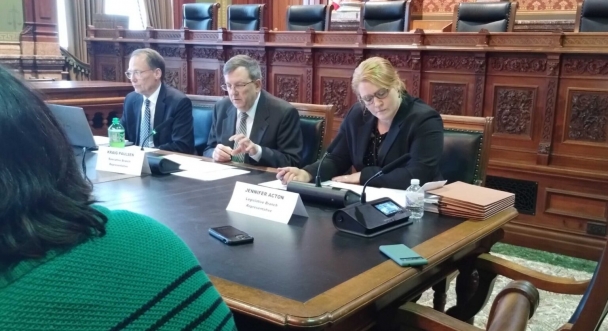State Revenue Estimate Dips Slightly as Lawmakers Discuss Tax Cuts

Jeff Plagge, Kraig Paulsen and Jennifer Acton reviewed state budget predictions for the upcoming year at the Revenue Estimating Conference meeting March 15, 2024. (Photo by Robin Opsahl/Iowa Capital Dispatch)
Despite a slight reduction in expected incoming taxes, the Revenue Estimating Conference predicted Iowa will collect about $9.6 billion in the current fiscal year as Iowa lawmakers begin review of individual income tax cuts proposed by Gov. Kim Reynolds and lawmakers.
The three-person panel consists of Iowa Department of Management director Kraig Paulsen, legislative analyst Jennifer Acton and Jeff Plagge, a public member and the director for Northwest Bank in Spencer. They projected a 2.2% decrease from revenue in the 2023 fiscal year, a slightly larger change than predicted at the December meeting. The panel also forecasted increased revenue in FY 2025 and 2026, at 0.7% and 1% respectively.
Despite the slight revenue decrease for FY 2024, Paulsen said the state is in a “very strong financial position” with no signs of economic downturns on the horizon. Iowa ended FY 2023 with a $1.83 surplus in the general fund, as well as $2.74 billion in the state’s Taxpayer Relief Fund and $902 million in reserve funds.
“I think there’s no reason to think the state can’t continue down the path of leaving more money in Iowans’ pockets,” Paulsen said.
Lawmakers shift focus to state budget, taxes
The REC meeting and end of the second “funnel” week at the Capitol moves lawmakers into the budgeting season for the 2024 legislative session. While there are still many policy bills still up for consideration, legislators typically begin work on finalizing budgets and making tax and other spending changes after hearing budget and economic updates from the REC.
Among the changes lawmakers plan to consider are proposals making cuts to Iowa’s individual income taxes. Reynolds released a proposal, Senate File 2398, to lower Iowa’s individual income tax rate from 5.7% to 3.65% retroactively for 2024, speeding up the reductions implemented in a 2022 law.
Her proposal would bring the tax from the current 5.7% rate to 3.65% in 2024, applied retroactively to the beginning of the year, with a drop to 3.5% in 2025. A Legislative Services Agency fiscal note on the bill found that the measure would result in a state general fund revenue decrease of $279.3 million in FY 2024, $1.627 billion decrease in FY 2025 and $901.3 million decrease in FY 2026, followed by further decreases until fiscal year 2030.
Rep. Bobby Kaufmann, R-Wilton, and Sen. Dan Dawson, R-Council Bluffs, chairs of the House and Senate Ways and Means committees, introduced a separate proposal that would drop Iowa’s individual income tax rate to 3.775% in 2026 and 3.65% in 2027. In subsequent years, further cuts to individual income tax rates would be implemented and financed through the “Iowa Taxpayer Relief Trust” until the individual income tax is eliminated.
Both proposals are still eligible for consideration. The governor’s bill has passed through a Senate committee, but Dawson said lawmakers are still discussing their preferred path forward on income tax changes.
House Speaker Pat Grassley told reporters Thursday that lawmakers plan to start taking up tax bills following the REC releasing projections. While slight adjustments may still come, he said the state is in a strong financial position to be able to make further tax cuts.
“We want to continue down the path of, ‘how quickly can we get this money back in the hands of Iowans?'” Grassley said. “… We still feel we’re in that position, especially with our ending balance and our Taxpayer Relief Fund, to be able to do that and get that money back to Iowans quicker.”
Following the REC meeting, Senate Majority Leader Jack Whitver said Republicans’ tax policy has made Iowa a “national leader in maintaining fiscal discipline, rewarding work and investment by reducing income tax rates, and cutting needless bureaucracy.”
“Now is the time to continue to implement these policies and Senate Republicans look forward to building on our success this year with the House and Governor Reynolds to enhance the truly great condition of our state,” Whitver said in a statement.
But Democrats called for Republicans to take action on other budget issues, including state aid for Iowa schools. The Iowa House passed legislation setting a 3% State Supplemental Aid rate, but senators have not yet debated the bill, or proposed an SSA rate. Iowa schools’ budget proposals for the upcoming school year are due Friday.
“We believe it’s time to make public schools our top priority again,” Rep. Timi Brown-Powers, D-Waterloo said in a statement. “Today’s budget estimate confirms there is no fiscal reason for GOP lawmakers to continue stalling funding for public schools, it’s just all politics for them. … There’s still time this session to work together, raise wages, lower costs, and invest in public schools before session adjourns.”
©Copyright 2024, Iowa Capital Dispatch. Published under Creative Commons license CC BY-NC-ND 4.0. Read more at iowacapitaldispatch.com.
Category:
The Eagle Grove Eagle
The Eagle Grove Eagle
P.O. Box 6
304 West Broadway
Eagle Grove, IA 50533
Phone: 1-515-448-4745
FAX: 1-515-448-3182
Email: news@eaglegroveeagle.com
Mid-America Publishing
This newspaper is part of the Mid-America Publishing Family. Please visit www.midampublishing.com for more information.